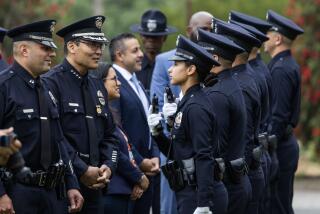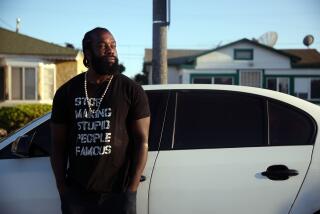Police Have Too Little Time to Patrol, Study Finds
Nearly 1,000 times a day in Los Angeles, someone calls the police on a matter that requires some police action, but the police do not come.
Callers are told that an officer will respond. But none are available, so none are sent.
That is what happens to one of every four callers to the Los Angeles Police Department’s 911 number, according to consultants retained by the department and the city Police Commission.
The consultants are from Public Administration Service, a private, nonprofit Virginia firm that has studied mainly small and medium-size police departments in cities such as Honolulu and Charlotte, N.C.
Response to Complaints
The firm was hired a year ago to determine how well the Los Angeles Police Department deploys its patrol officers after some community leaders charged that the department favors affluent areas over poorer ones.
The consultants found one striking inequity--that officers in affluent areas have more free time to patrol. But they concluded that every neighborhood is shortchanged. They said the Police Department does not commit enough of its 3,000 patrol officers to actually patrolling the city, and therefore does not respond quickly enough to calls for help.
They said the department, which has 7,250 officers in all, diverts too many patrol officers to a variety of special assignments such as truancy and narcotics details.
Los Angeles police have not publicly discussed the study at length since it was released two weeks ago. Chief Daryl F. Gates has said that he is waiting to discuss the report and his department’s deployment policies on Tuesday when the study is formally presented to the Police Commission.
Predicts No Big Changes
However, Gates has sent a message to his officers telling them on a videotape that the study was a good one and that he was “in sync” with its recommendations, but that no big changes will be made.
The chief did not specifically address the issue of the 1,000 unanswered calls, which the study itself mentioned only in passing while discussing what it deemed to be the root cause of long response times: a lack of patrol officers available to be dispatched.
The study classified these unanswered calls as “requests for service withdrawn before dispatch.”
“Many of these calls apparently resolved themselves,” the report said, “because of lengthy delays in dispatching an available patrol unit.” In other words, some callers called back to say that police were no longer needed or were called back by dispatchers who found out the same thing.
The consultants said they were hampered in evaluating the nature of the unanswered calls because of a lack of data, but suggested that police officials look into the matter.
‘Low-Priority Requests’
“It is . . . assumed that nearly all of these calls . . . were actually routine, low-priority requests since calls of an emergency nature are broadcast almost immediately,” the report said. “(Less serious) calls classified as urgent receive a priority designation and are closely monitored.”
Los Angeles patrol officers respond to an average of about 300 emergencies daily and answer about 1,000 less serious but still urgent calls, the report said. They also are dispatched to handle about 560 routine calls. Another 750 calls involve report-taking or traffic matters.
The study gave examples of routine, low-priority calls ranging from felonies discovered after the fact and in which evidence had grown cold, to misdemeanors that had just occurred in which evidence and witnesses were still available, to reports of nuisance disturbances in progress.
The report suggested that there is a much greater demand for police services in Los Angeles than is apparent from the number of calls the department receives.
The experts said this demand is pent up in part because some people have gotten so discouraged by long response times that they have given up calling the police for help.
Other Reasons
They also cited other reasons:
- Cultural and language barriers leave many new immigrants reluctant to report crimes.
- Older people in poorer areas are said to be intimidated by 911 operators so they do not report the drug sales and gang activities they see.
- The “style patrol officers may be using to answer some calls for service may also be depressing citizen demand.”
The study suggested that the department stop dispatching low-priority calls in bunches, which “encourages a mind-set among some of the officers that servicing low-priority calls, which account for the bulk of all calls, is not important, constituting a ‘necessary nuisance.’ ”
While the number of times people do not call the police is impossible to gauge with precision, the consultants noted that police here get 10% to 15% fewer calls per capita than police elsewhere.
The consultants’ attempt to measure the problem consisted of interviews with 67 community leaders who were not identified by name.
Don’t Bother to Call
About one-third of these leaders, “particularly blacks and Latinos, stated that people they knew did not bother calling the police for a variety of incidents because they believe the police will not respond.”
The report said, “People expect late responses to all types of calls including emergencies.”
The experts said Los Angeles police typically took 9.2 minutes to arrive at the scene of an emergency during the period studied--July, 1986, to June, 1987.
They said emergency response time should average no more than seven minutes, which they termed a modest goal chosen only because it was “reasonable and attainable.”
“In the experience of members of the study team, dispatch delays for emergency calls should be around one minute, with travel time requiring between five and six minutes,” the study said.
The consultants found no discrimination in response times against inner-city areas, finding the times “uniformly long for all divisions in the city.” But they did find disparities in another sphere.
Little Uncommitted Time
They said patrol officers in inner-city areas tend to be so busy handling calls that they have little uncommitted time to patrol the areas for which they are primarily responsible.
Referring to this uncommitted or discretionary time as “pro-active”--as opposed to reactive--the report said the amount of it varies widely from one police division to the next.
“Less pro-active time is available in inner-city divisions with more serious crime problems than found in outlying divisions,” the report said. “For example, patrol units in the West Los Angeles and Devonshire divisions have over half their time available for pro-active work. Patrol units in the Central and 77th Street divisions have only about one-fifth of their time available for pro-active tasks.”
The study said officers should have at least 40% of their time free to patrol neighborhoods.
The report also said that many Los Angeles police officers take a surprisingly long time to handle calls, a practice that “could partially explain the long times required for dispatchers to find units to assign to (new) calls.”
“Time spent at the scene of calls for service as well as time spent on officer-initiated activity and administrative duty are higher than is usually observed in studies such as this,” the report said. “The evidence suggests that a sizable minority of officers spend more time than required.”
Critical of Supervision
The report also was critical of a lack of supervision. Sergeants, patrol officers’ immediate supervisors, spend too much time in stations on administrative tasks, the report said.
The report recommended a citywide redeployment of the department’s approximately 3,000 patrol officers, most of whom are either assigned to fixed posts or to a 1,200-officer pool, which is divided among the divisions in accordance with the department’s uniform deployment formula, or UDF.
The study criticized the complex formula as imprecise.
Furthermore, it said, officers whose assignments are governed by it are frequently diverted from patrolling neighborhoods and answering calls to special projects.
“The number of special assignments and the loaning of division staff to special units significantly reduces the impact of the UDF,” the study found. “Consequently, the officers deployed through the UDF make only a small contribution toward improving response time to emergency calls for service.”
Urge More Complex Model
The study recommended that another, more complex mathematical model be substituted for the UDF.
The new model, it said, could be used to calculate the number of officers a division needs to meet the specific goals of delivering emergency responses in seven minutes and leaving 40% of patrol officers’ time for routine patrols.
The new model would result in the department significantly expanding the number of its officers assigned to fixed posts--that is, to patrol specific neighborhoods and answer calls there--in every division.
The department now assigns 1,107 of its officers to patrol 123 areas of the city around the clock. The new plan would use 1,837 officers, with the additional officers coming from the UDF pool.
The effect of that, the study suggested, would be to restrict the practice of using officers in the UDF pools for specialized assignments.
Areas of Specialty
The study suggested that patrol officers, with their large blocks of uncommitted time, might get involved in some of the specialized areas such as “crime prevention, youth services . . . and narcotics enforcement” in neighborhoods they know.
The experts also urged the department to significantly expand the practice of taking crime reports over the phone. Only about 4% of calls are now handled this way, the study said.
“Many departments across the nation have diverted upwards of 35% of their offense reports . . . through ‘telephone reporting’ units,” the study said. Such reports might range from telephone threats to vandalism to embezzlement to auto theft, the report said.
More to Read
Sign up for Essential California
The most important California stories and recommendations in your inbox every morning.
You may occasionally receive promotional content from the Los Angeles Times.










